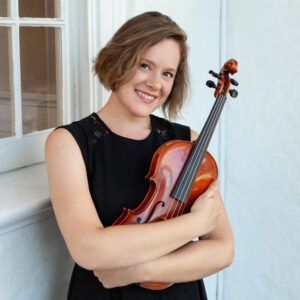 Coming from a musical family, Alison Tatum was immersed in music growing up and started playing the violin at six: “My mom worked as a band music teacher, […]and my dad was the executive director of the Folly Theater in Kansas City. What that meant for me is I went to many high-quality concerts for free growing up and heard a lot of really good music.” Enticed by the challenge and excitement of violin, Alison graduated from the University of Missouri with a double major in violin performance and music theory in 2012.
Coming from a musical family, Alison Tatum was immersed in music growing up and started playing the violin at six: “My mom worked as a band music teacher, […]and my dad was the executive director of the Folly Theater in Kansas City. What that meant for me is I went to many high-quality concerts for free growing up and heard a lot of really good music.” Enticed by the challenge and excitement of violin, Alison graduated from the University of Missouri with a double major in violin performance and music theory in 2012.
Like most violin-majored students, Alison went straight to graduate school to receive rigorous musical training and better prepare herself as a professional musician, earning a Master of Music degree in 2014 and a Performance Certificate in 2016 from DePaul University. Playing mostly classical music throughout her music career, Alison found herself being burned out by the classical pieces and was slowly losing aspiration to become a professional violinist: “[The] classical music culture is very perfectionistic […], and everybody is playing the same thing. There’s no individualized decision-making in the orchestra.”
Alison’s classical music career took an unexpected twist in 2014 when a stranger showed up at her door: “I was practicing at home one day, and I got a knock on the door from this stranger. He had been out for a walk and had heard me practicing as he walked by my house. And he had written a musical. They needed a violinist to play in the musical, so he offered me the job.” This strange man turned out to be a composer who was composing for a musical based on a popular TV show back in the 60s: Beverly Hillbillies. After five weeks of performing for the musical, Alison fell in love with musical theaters because of the tremendous amount of creative freedom she got out of it: “This musical theater stuff and pit orchestra came on me by accident and turned out to be a great fit. What I really enjoy is that I’m the only one playing my part. There’s a lot of responsibility, but there’s also a lot of freedom to phrase things in a certain way or make those creative decisions that don’t exist in an orchestra setting.”
The performing arts industry took a significant hit when Covid happened in 2020. Millions of freelance performers like Alison were compelled to take on multiple part-time jobs and forced to consider alternatives that were more stable to make ends meet; she says: “I want to separate my income and the ability to make money from the music because having my income tied to my art has made the art just not so fulfilling all the time.” Alison was introduced to the MSLCE program by a fellow MSLCE alumna as she was exploring her “alternatives.” Hoping to pivot to a more stable business career where creatives can still make use of their creative minds, Alison came to the MSLCE program to get a second master’s degree.
Apart from performing, Alison has also been teaching violin and running her own string quartet business, called Amethyst Ensemble. As a musician and a teacher, Alison strives to unlock the potential of others, helping them grow into the best versions of themselves. After spending almost a year in the MSLCE program, Alison’s study at Northwestern and her unwavering passion for learning has led her to explore Learning and Development as a new career direction, not necessarily in a teaching role but as a creative designer for instructional materials and coaching programs.
by Olive Mingxuan Ju
Read more on our blog and follow Northwestern’s MS in Leadership for Creative Enterprises program on Facebook and Instagram.